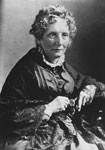Frederick Douglass

Frederick Douglass was an escaped slave who learned how to read and write and then became one of the most eloquent opponents of slavery in the United States. He first earned fame writing his autobiography. His most powerful speech was probably given on July 5, 1852, entitled "What to the Negro is the Fourth of July?"
Read the following excerpt:
"What, to the American slave, is your 4th of July? I answer; a day that reveals to him, more than all other days in the year, the gross injustice and cruelty to which he is the constant victim. To him, your celebration is a sham; your boasted liberty, an unholy license; your national greatness, swelling vanity; your sound of rejoicing…are to him a, mere bombast, fraud, deception, impiety, and hypocrisy -- a thin veil to cover up crimes which would disgrace a nation of savages. There is not a nation on the earth guilty of practices more shocking and bloody than are the people of the United States, at this very hour."
Check for Understanding:
With your
![]() tool, use your own words to summarize in one sentence why the fourth of July is the worst holiday for the American slave?
tool, use your own words to summarize in one sentence why the fourth of July is the worst holiday for the American slave?

Harriett Beecher Stowe was an abolitionist who became a celebrated author worldwide with her 1852 novel, Uncle Tom's Cabin, describing a cruel slave master, Simon Legree, and his devoted, Christ-like slave, Tom. Queen Victoria of England reportedly read the novel and wept. The book built so much sympathy for slaves and the South was so outraged at its publishing that President Lincoln, upon meeting Stowe, reportedly said, "So you're the little lady that started this war."
Read the following on Legree introducing himself to Tom after just buying him:
"Now," said [Legree], doubling his great, heavy fist into something resembling a blacksmith's hammer. "do ye see this fist?" he said, bringing it down on Tom's hand. "Look at these yer bones! Well, I tell ye this here fist has got as hard as iron knocking down [slaves]..." said he, bringing his fist down so near to the face of Tom that he winked and drew back. "I tell ye; quick, straight, the moment I speak, Ye won't find no soft spot in me, nowhere. So, now, mind yerselves; for I don't show no mercy!.... That's the way I begin with my [slaves],"
Check for Understanding:
With your
![]() tool, use your own words to summarize in one sentence how Stowe was building sympathy for Tom.
tool, use your own words to summarize in one sentence how Stowe was building sympathy for Tom.

William Lloyd Garrison founded the leading abolitionist newspaper in the country called The Liberator. In 1854, he delivered a famous speech called "No Compromise with Slavery"
Read an excerpt from the speech:
"The Abolitionism which I advocate (support) is as absolute as the law of God, and as unyielding as His throne. It admits of no compromise. Every slave is a stolen man; every slaveholder is a man-stealer. By no precedent, no example, no law…no compromise of circumstances, is slaveholding right or justifiable. While a slave remains in his fetters (chains), the land must have no rest."
Check for Understanding:
With your
![]() tool, describe Garrison's position on slavery in one sentence.
tool, describe Garrison's position on slavery in one sentence.
